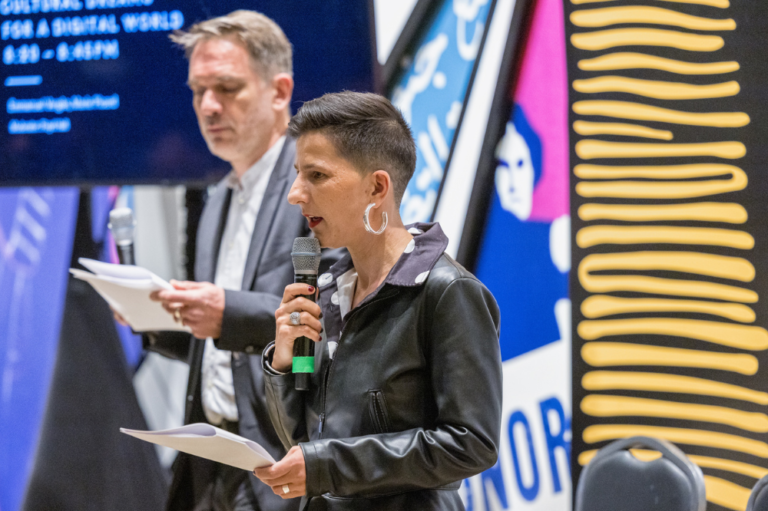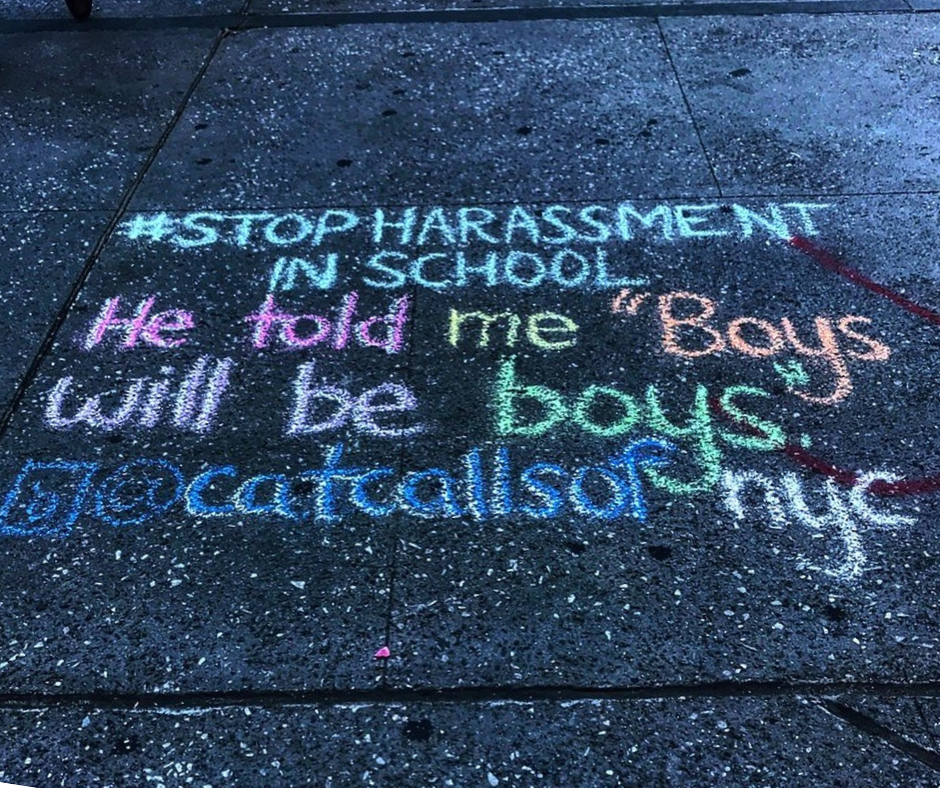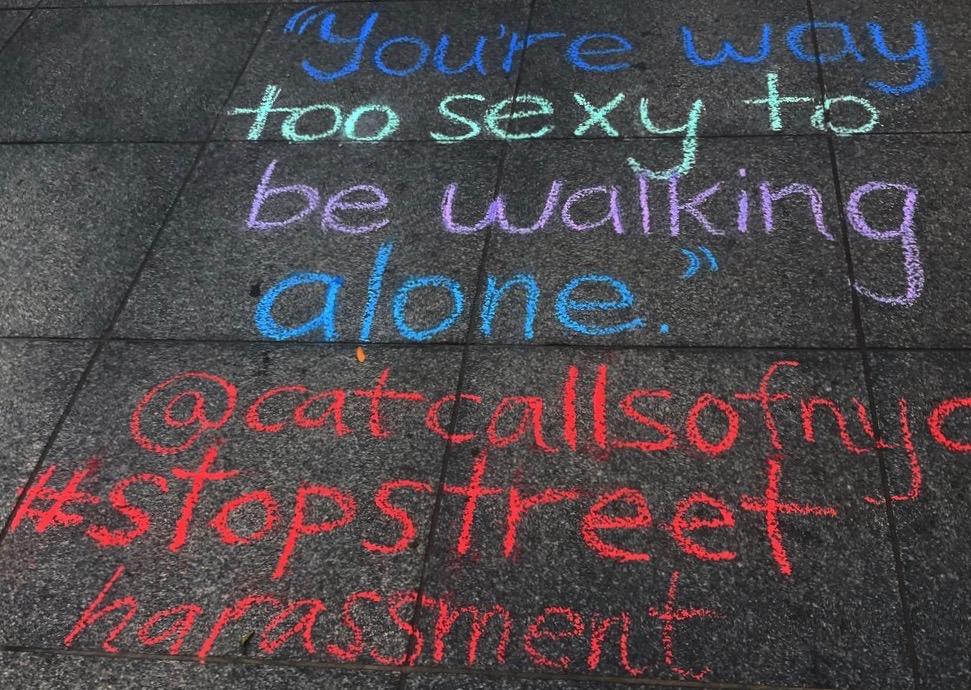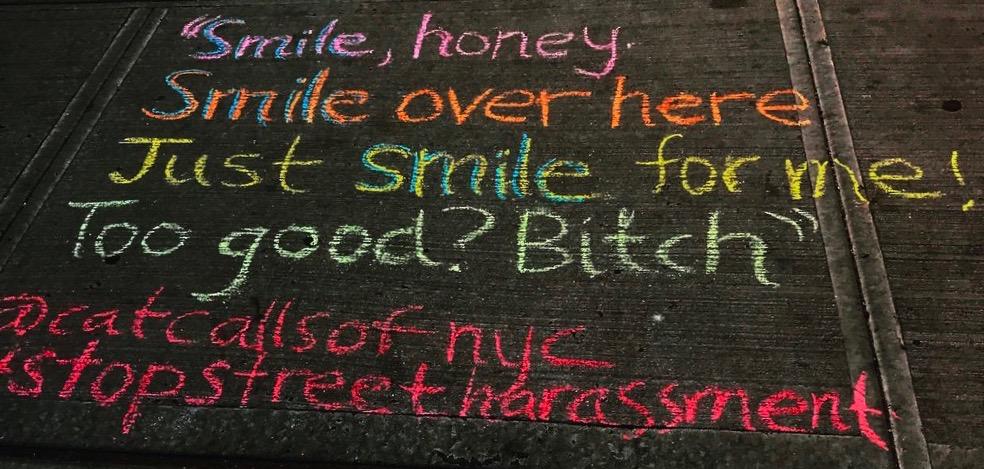
Street Harassment Advocacy Needs Men

Courtesy of Sophie Sandberg
By Sophie Sandberg
In a post #MeToo world, progress has been made to raise awareness about sexual and gender-based harassment, but as we celebrate International Women’s Day on March 8, it must be acknowledged we still have a long way to go. The activist and founder of ‘Catcalls of NYC’, which draws attention to the verbal abuse women suffer in public space, appeals to men for them to help redefine some less toxic masculinity.
When I was a teenager growing up in New York City, I started getting catcalled by adult men.
“Hey Sexy” “Nice Legs” “Beautiful!” “Come on, say thank you!” “I want to fuck you.”
The reality of being objectified and sexualized on the street is something that has followed me ever since then. As a college student in New York, the comments continued and were often extremely vulgar and aggressive. Studying abroad in Paris at 21 years old, I understood the comments less (my French classes didn’t cover those words), but there were certain things that translated: a man standing on a street corner with his pants undone to expose himself to me and my friend, a man who groped me on a crowded metro. Street harassment has no boundaries.
These experiences have shaped me, like they have shaped many girls, women, and LGBTQIA+ people, who are targeted in public space with sexual and gender-based harassment. In a recent UN Women study, 1 in 2 women reported feeling unsafe walking alone at night. This doesn’t surprise me. My experiences with street harassment impact how I feel in public space. They impact my trust in men. If I see a man when I’m walking down the street or feel a presence behind me, I get tense. Will he say something to me? Will he get angry if I don’t respond? Am I being followed?
Taking Action
I hear about experiences like mine every day through Catcalls of NYC, my Instagram-based initiative that raises awareness about street harassment by writing the word-for-word phrases in chalk and posting them to social media. By sharing the stories publicly, I promote dialogue, story sharing, and community on this issue. Since I started Catcalls of NYC almost 6 years ago, it has gained 170,000 followers on Instagram, rallied a group of 40 passionate New York-based volunteers, and inspired 200 Catcalls pages around the world.
Approximately 10,000 stories have been shared anonymously via Instagram direct message. I have a disturbingly clear picture of how these experiences impact young girls, trans and nonbinary individuals. After experiencing catcalling, some victims throw out clothing they were catcalled in. They go outside less at night. They are self-conscious. They may experience anxiety or depression.

Courtesy of Sophie Sandberg
“It’s Normal”
Too often, catcalling is considered a normal part of growing up. One girl shared with me that when she was first catcalled at 12, her father congratulated her, “you’re a woman now.” Another girl messaged that when she reported her male classmate for masturbating in front of her, she was told by her principal “boys will be boys.” Normalizing gender-based harassment downplays its severity and puts pressure on girls and women to accept it, while taking necessary precautions. Don’t go out late. Cover up more. Trust men less. Normalizing harassment is equally harmful to boys. It suggests to boys that they are incapable of refraining from inappropriate sexual behavior. It suggests that from a young age boys are expected to harm girls.
In a #MeToo world, there is ample discussion about sexual and gender-based harassment that has led to increased awareness. However, mainstream coverage often focuses on certain perpetrators, rather than shifting the culture. These moments of reckoning ignore a central fact: perpetrators were taught to cross boundaries and shown that, when they did, there would be no accountability and no consequences. This makes targeting individual harassers a game of whack-a-mole. With each new perpetrator publicly shamed, there are hundreds of others who have not been reported. There are hundreds of girls and women who are told that their experience of harassment was just boys being boys, just words, just flirting, just a compliment.
Denormalizing gender-based harassment liberates people of all genders. It validates the experiences of marginalized genders who have faced harassment and it allows us to redefine manhood in a more positive light.

Courtesy of Sophie Sandberg
Where are we going?
I see the movement against gender-based harassment moving towards a more collective approach. Gender-based harassment and gender norms impact everyone: how can we start a conversation that includes people of all genders in the solution?
During 16 days of activism, I led a campaign on accountability that called upon men to speak about their experiences with gender-based harassment and gender norms. The men I spoke to shared with honesty and vulnerability. One interviewee, Mike Johnson, spoke about distancing himself from a friend who called women “bitches.” Another interviewee, Danny Woodburn, reflected on a formative experience of male bonding over porn and how that encouraged him and his friends to see women as objects for sexual pleasure.
As I continue to share stories of gender-based harassment (predominantly perpetrated by men), our Instagram posts get flurries of comments “men are trash” “I hate men” and even “KAM (kill all men).” While this anger comes from a legitimate place of trauma and hurt, it precludes productive conversations that must involve men as allies and advocates for redefining manhood.
But constructive dialogue is not only possible; it is happening. I have collaborated with organizations working towards healthy masculinity and providing positive role models for boys –A Call to Men, Man Cave, and others. This work addresses toxic masculinity head on and encourages behavior that invites respect rather than hate. Giving victims and survivors a space to share stories is essential for street harassment advocacy. Now, we are ready for men to share their stories too, and listen with respect, as we move towards a collective redefinition of gender norms.
Sophie Sandberg is a gender justice activist, artist, and founder of the popular chalk art initiative against street harassment, Catcalls of NYC. She studied gender and sexuality at NYU, and dedicates herself to fighting gender-based abuse by being involved in local and global actions, such as giving talks at the UNESCO. She will take part in an event at Villa Albertine soon… stay tuned!


